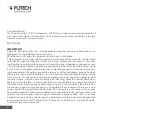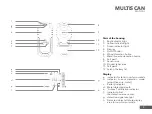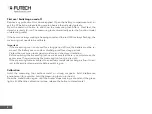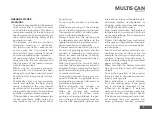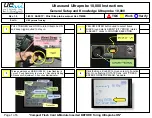
MULTISCAN
9
MANUAL
HAZARDS OF USE
WARNINGS
∙ The person responsible for the product
must ensure that it is used in accord-
ance with the instructions. This person
is also accountable for the training and
the deployment of personnel who use
the product and for the safety of the
equipment in use.
∙ The absence of instruction, or the in-
adequate imparting of instruction,
can lead to incorrect or adverse use,
and can give rise to accidents with
far-reaching human, material, financial
and environmental conse- quences.
∙ All users must follow the safety direc-
tions given by the manufacturer and
the directions of the person respon-
sible for the product.
∙ Watch out for erroneous measure-
ment results if the product has been
dropped or has been misused, modi-
fied, stored for long periods or trans-
ported.
∙ Periodically carry out test measure-
ments and perform the field adjust-
ments indicated in the user manual,
particularly after the product has been
subjected to abnormal use and before
and after important measurements.
∙ If the product is used with accessories,
for example masts, staffs, poles, you
may increase the risk of being struck
by lightning.
∙ Do not use the product in a thunder-
storm.
∙ Inadequate securing of the working
site can lead to dangerous situations,
for example in traffic, on building sites,
and at industrial installations.
∙ Always ensure that the working site
is adequately secured. Adhere to the
regulations governing safety and acci-
dent prevention and road traffic.
∙ If the accessories used with the prod-
uct are not properly secured and the
product is subjected to mechanical
shock, for example blows or falling,
the product may be damaged or peo-
ple may sustain injury.
∙ When setting-up the product, make
sure that the accessories are correctly
adapted, fitted, secured, and locked in
position. Avoid subjecting the product
to mechanical stress.
∙ During the transport, shipping or dis-
posal of batteries it is possible for in-
appropriate mechanical influences to
constitute a fire hazard.
∙ Before shipping the product or
disposing of it, discharge the bat-
teries by running the product
until they are flat. When trans-
porting or shipping batteries, the per-
son in charge of the product must en-
sure that the applicable national and
international rules and regulations are
observed. Before transportation or
shipping contact your local passenger
or freight transport company.
∙ High mechanical stress, high ambient
temperatures or immersion into fluids
can cause leackage, fire or explosions
of the batteries.
∙ Protect the batteries from mechanical
influences and high ambient tempera-
tures. Do not drop or immerse batter-
ies into fluids.
∙ Short circuited battery terminals can
overheat and cause injury or fire, for
example by storing or transporting in
pockets if battery terminals come in
contact with jewellery, keys, metallized
paper or other metals.
∙ Make sure that the battery terminals
do not come into contact with metallic
objects.
∙ During the operation of the product
there is a hazard of squeezing extrem-
ities by moving parts.
∙ Keep extremities in a safe distance
from the moving parts. If the prod-
uct is improperly disposed of, the
following can happen: If polymer
parts are burnt, poisonous gases are
produced which may impair health.
If batteries are damaged or are heat-
ed strongly, they can explode and
cause poisoning, burning, corrosion


